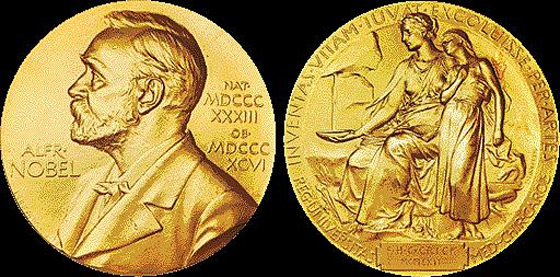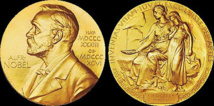The academy in May announced it would not have a literature laureate for 2018, amid a sex abuse scandal that uncovered deep divisions among members.
The last time the academy "reserved" the prize was in 1949 when US author William Faulkner received his award the following year.
Meanwhile, other award-giving institutions said announcements were going ahead as planned.
The prize for Medicine or Physiology is due Monday and awarded by a 50-strong panel at the Karolinska Institutet, a medical research institute.
It is followed by the Nobel Prize for Physics on Tuesday, and Chemistry on Wednesday, October 3. The economics prize, not one of the original awards endowed by Swedish industrialist and dynamite-inventor Alfred Nobel, rounds off the announcements on October 8.
Each award is worth 9 million kronor (1 million dollars) this year. In line with tradition, the awards are presented to the winners on December 10, the anniversary of Nobel's death.
In addition to the discoveries that the science prizes highlight, interest will centre on whether any women will be recognized.
The most recent female winner of a Nobel science prize was Youyou Tu of China who in 2015 shared the medicine prize for her discoveries to combat malaria.
Goran Hansson, permanent secretary of the Royal Swedish Academy of Sciences that awards the Nobel prize for physics, chemistry and economics discussed the issue last year.
The gender imbalance was partly linked to past "bias against women," he said after the 2017 science announcements.
There were also "far fewer women scientists if you go back 20 or 30 years," he added, noting that discoveries needed to be verified and validated before being awarded.
Hansson said the Nobel committees encouraged all "nominators for all the prizes to consider women scientists who have made important contributions."
Guessing and betting is under way for the Peace Prize, which will be announced on October 5 in the Norwegian capital, Oslo.
The Norwegian Nobel Committee received 331 nominations, the second-highest tally since it was first awarded in 1901.
The five-strong committee advises those making nominations not to reveal their proposals, but there are no formal rules against doing so, explaining why some names become public.
A theme that could be awarded in 2018 was sexual violence in conflict, some researchers said.
Congolese physician Denis Mukwege, who runs a hospital that has treated thousands of victims of mass rape committed by warring groups in the eastern Democratic Republic of Congo, was among known nominees.
Mukwege could win along with Nadia Murad Basee, a young Yezidi woman from Iraq who has testified before the UN Security Council on torture and sexual slavery at the hands of Islamic State, said Henrik Urdal, director of the Peace Research Institute in Oslo (PRIO).
PRIO is not affiliated with the Nobel prize, but its directors compile shortlists.
Norwegian historian Asle Sveen, who has specialized in the history of the Peace Prize, said it was "very difficult to tip this year."
He also mentioned Mukwege and observed that the #MeToo movement has been nominated by among others Anniken Hauglie, the Norwegian minister of labour and social affairs.
A difficulty was however deciding "who would receive the prize on behalf of #MeToo," he said.
Several betting sites offered low odds for a prize to South Korean President Moon Jae In and North Korean leader Kim Jong Un amid a thaw in relations and Kim's statements that Pyongyang was willing to give up its nuclear arms.
"The big breakthrough in international relations this year had to do with North and South Korea," said Dan Smith, director of the Stockholm International Peace Research Institute (SIPRI).
Smith however said that while the Oslo-based committee has in the past "acted to give encouragement" to a peace process - as in 2016 when it honoured Colombia's then president Juan Manuel Santos - "it might be premature" in Korea.
------------------------------------------------------------------------------------------------------------------
The last time the academy "reserved" the prize was in 1949 when US author William Faulkner received his award the following year.
Meanwhile, other award-giving institutions said announcements were going ahead as planned.
The prize for Medicine or Physiology is due Monday and awarded by a 50-strong panel at the Karolinska Institutet, a medical research institute.
It is followed by the Nobel Prize for Physics on Tuesday, and Chemistry on Wednesday, October 3. The economics prize, not one of the original awards endowed by Swedish industrialist and dynamite-inventor Alfred Nobel, rounds off the announcements on October 8.
Each award is worth 9 million kronor (1 million dollars) this year. In line with tradition, the awards are presented to the winners on December 10, the anniversary of Nobel's death.
In addition to the discoveries that the science prizes highlight, interest will centre on whether any women will be recognized.
The most recent female winner of a Nobel science prize was Youyou Tu of China who in 2015 shared the medicine prize for her discoveries to combat malaria.
Goran Hansson, permanent secretary of the Royal Swedish Academy of Sciences that awards the Nobel prize for physics, chemistry and economics discussed the issue last year.
The gender imbalance was partly linked to past "bias against women," he said after the 2017 science announcements.
There were also "far fewer women scientists if you go back 20 or 30 years," he added, noting that discoveries needed to be verified and validated before being awarded.
Hansson said the Nobel committees encouraged all "nominators for all the prizes to consider women scientists who have made important contributions."
Guessing and betting is under way for the Peace Prize, which will be announced on October 5 in the Norwegian capital, Oslo.
The Norwegian Nobel Committee received 331 nominations, the second-highest tally since it was first awarded in 1901.
The five-strong committee advises those making nominations not to reveal their proposals, but there are no formal rules against doing so, explaining why some names become public.
A theme that could be awarded in 2018 was sexual violence in conflict, some researchers said.
Congolese physician Denis Mukwege, who runs a hospital that has treated thousands of victims of mass rape committed by warring groups in the eastern Democratic Republic of Congo, was among known nominees.
Mukwege could win along with Nadia Murad Basee, a young Yezidi woman from Iraq who has testified before the UN Security Council on torture and sexual slavery at the hands of Islamic State, said Henrik Urdal, director of the Peace Research Institute in Oslo (PRIO).
PRIO is not affiliated with the Nobel prize, but its directors compile shortlists.
Norwegian historian Asle Sveen, who has specialized in the history of the Peace Prize, said it was "very difficult to tip this year."
He also mentioned Mukwege and observed that the #MeToo movement has been nominated by among others Anniken Hauglie, the Norwegian minister of labour and social affairs.
A difficulty was however deciding "who would receive the prize on behalf of #MeToo," he said.
Several betting sites offered low odds for a prize to South Korean President Moon Jae In and North Korean leader Kim Jong Un amid a thaw in relations and Kim's statements that Pyongyang was willing to give up its nuclear arms.
"The big breakthrough in international relations this year had to do with North and South Korea," said Dan Smith, director of the Stockholm International Peace Research Institute (SIPRI).
Smith however said that while the Oslo-based committee has in the past "acted to give encouragement" to a peace process - as in 2016 when it honoured Colombia's then president Juan Manuel Santos - "it might be premature" in Korea.
------------------------------------------------------------------------------------------------------------------









 Home
Home Politics
Politics











